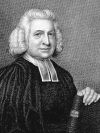
John Rogers, Puritan minister of Dedham, Essex in the year 1620, preached a memorable sermon on the theme of making the Bible an important part of daily life, at the same time allowing himself some pulpit dramatics.
First, he portrayed God addressing the congregation and saying: "I have trusted you so long with my Bible, but you have slighted it: it lies in your houses covered over with cobwebs, you care not to listen to it. Because of this you shall have my Bible no longer."
Removing the huge pulpit Bible from its place, he covered it over with a cloth, then kneeling down in the pulpit he impersonated the people crying: "Oh God, whatever you do, don't take the Bible away from us. Take our children, burn our houses, destroy our goods, but spare us the Bible."
Then, acting as God again, he said: "Say you so? Well, I will try you a little while longer." Replacing the Bible onto the reading desk, he said: "I will see from now on how you use it, whether you love it more, observe it more, practise it more, and live more according to it."
The result of this? The whole congregation dissolved in tears. Thomas Goodwin, who was an eyewitness to this occasion, said that he was compelled to hang for a quarter of an hour upon the neck of his horse weeping before he had power to mount, so strange an impression was there upon him and generally upon the people.
John Rogers had touched upon a very sensitive spot, for Puritanism, whatever else it might have had against it and with all its flaws, it was a Bible movement. They saw reverence of God as reverence for his Word, service for God as obeying his Word and disregard of Scripture as the greatest possible insult to its divine author. But should not all decades be like that?
(To view an online version of the current edition of the Christian Herald and to learn about the ministry of CWR, please proceed via our Links to Other Websites.)

